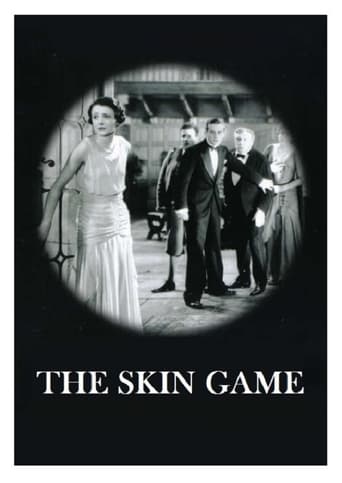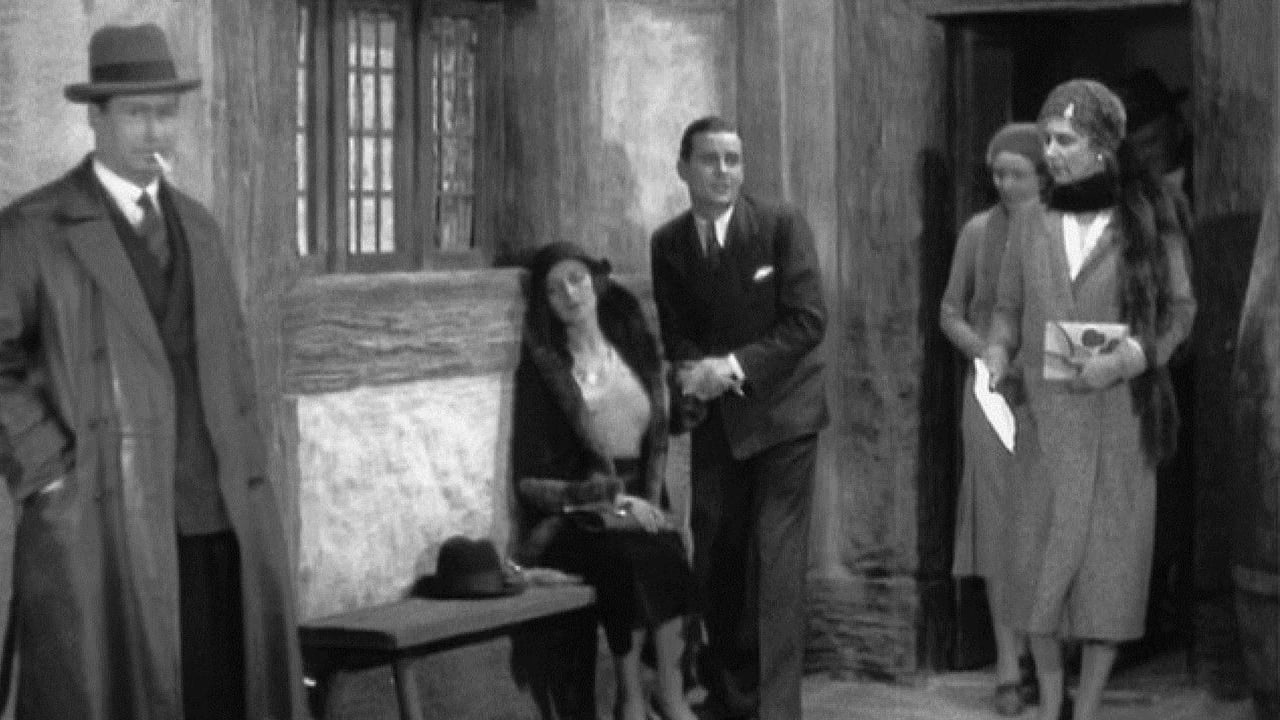jacobs-greenwood
Directed by Alfred Hitchcock, who along with his wife Alma Reville adapted the John Galsworthy play, the film's title (in lieu of its more modern definition) refers to something akin to "an eye for an eye" where everyone turns out blind in the end. In other words, no one has "clean hands", in the final accounting of this kind of grudge match.This average drama is not as bad as I was led to believe, and actually contains quite a good, early talkie performance by Edmund Gwenn, playing a character much different from the more gentle roles he would take later in his career. The titled "game" is between industrialist Hornblower (Gwenn), who wants to build factories on what has always been beautiful rolling hills in the name(s) of progress and profit, and the Hillcrist family, who owns (and has always owned) a country home in this idyllic setting. The film's sound quality, so poor during the auction sequence that one can't hear the reading of the land's particulars, improves as the story progresses.Squire (C.V. France) and Mrs. Hillcrist (Helen Haye) are informed by an old farmer (Herbert Ross) and his wife (Dora Gregory), the Jackmans, who have worked the land they've just sold for 30 years, that the new owner, Mr. Hornblower, is planning to build a factory complete with smokestacks on the property. The Hillcrists had a verbal agreement with Hornblower not to evict the Jackmans, but Hornblower explains that he hasn't been able to buy the land he'd intended, so he really has no choice. Gwenn delivers quite a capitalistic monologue, perhaps the film's best scene, as he alternately oozes charm and rigidity. The thought of a factory being built so close to their country home so horrifies the Hillcrists that they employ their lawyer Dawker (Edward Chapman) to find a way out.After unsuccessfully outbidding Hornblower at a land auction (Ronald Frankau plays the auctioneer), during which they'd shunned his daughter-in-law Chloe (Phyllis Konstam) out of spite, the Hillcrists learn from Dawker that Chloe has a sordid past. Konstam, foreshadowing Hitchcock's later use of sexy women, looks stunning; the director utilizing shadows to emphasize her (near hyperventilating) swelling breast. Mrs. Hillcrist is willing to exploit Chloe's past, while the Squire remains uninvolved, insisting their daughter Jill (Jill Esmond), who'd been "flirting" with the youngest Hornblower, Rolf (Frank Lawton), remain "in the dark".Chloe had been a correspondent, something of which her husband Charles (John Longden), Hornblower's eldest son and business partner, was unaware. Dawker uses another man (R.E. Jeffrey, in a leather coat), who'd been at the auction, to set Chloe on edge. When Hornblower finds out about his daughter-in-law's past, he's forced by Dawker and Mrs. Hillcrist to sell back the auction land at a huge loss (5,000 pounds). Dawker had utilized both the man in the leather coat and one of her past clients (George Bancroft) to make Chloe admit her scandalous past. Hornblower makes Dawker and Mrs. Hillcrist hold a bible while swearing to keep quiet about what they know regarding Chloe.The unscrupulous Dawker is unable to keep the secret from Charles, who was curious as to why his father no longer owned title to the auction land. He pursues her to the Hillcrist's home where she commits suicide upon hearing, from behind a curtain, of her husband's loss of any love for her (he'd learned the truth). After helping Rolf fish Chloe's body out of the Hillcrist's swimming pool, Hornblower admits to the Squire that he is beaten. The Squire laments the nature of a "skin game".
kidboots
John Galsworthy was one of the most popular British novelists of the early twentieth century - his main claim to fame was "The Forsyth Saga" a long series of books following the fortunes of an extended family, principally the older son Soames and his obsession with wealth and property. He also wrote plays - most popular was "The Skin Game".The plot dealt with two families of differing social types in rural England just after the the First World War. The Hillcrists have lived in the same manor house for generations. They are "old money" and the shambling Squire can be seen as a representative of the type of aristocracy who actually caused the Great War. The Hornblowers, on the other hand, are "nouveau riche" and the single minded father (stunningly played by Edmund Gwenn), much to the Squire's disgust has just evicted family retainers, the Jackman's, and plans to surround the Hillcrist estate with factories. Even though Hornblower doesn't have "ancestors" he believes the future belongs to his kind and that the Hillcrists are an anachronism and obstruction to prosperity.To me there is not much attempt to bring the play out from it's stage origins and the only time Hitchcock puts his stamp on it was during the auction scene (but that was also a highlight of the stage play as well). The camera catches the excitement and frenzy of a bidding war during the auction of "The Sentry" - a residential parklike acreage that Hillcrist wants to preserve as the last bit of open land. Hornblower is eventually the winner but due to the shenanigans of Hillcrist, is forced to pay twice it's value and he is furious. The Hillcrists are also angry but plan to get even after hearing of the dark past of Chloe, who is married to Charles, Hornblower's son. Jill Hillcrist (Jill Edmonds) stands in the middle, drawn to Rolf (Frank Lawton) but hating what the family stands for.Chloe was once a professional co-respondent employed by a London agency and Mrs. Hillcrist and their unscrupulous agent Dawker plan to use it to the family's advantage, even though the Squire is above such muckraking. The play was similar to Galsworthy's "The Forsyth Saga" in that it was about social change and the breakdown of conventional class structure. Written at the beginning of the 1920s, an era which saw the rise of the middle class - in the film represented by the ambitious Dawker. Among the players - Jill Esmond, at the time married to Laurence Olivier, went to Hollywood with him but never seemed to photograph as youthful or engagingly as in this movie. Frank Lawton also went to Hollywood where he starred in "David Copperfield". Edmund Gwenn had a massive career in Hollywood but he quickly found a niche in "kindly old gentlemen" roles and never had the variety he did in his British movies. John Longden was in a few early Hitchcocks, went to Australia for a few years and appeared in the controversial "The Silence of Dean Maitland" (1934).
bkoganbing
John Galsworthy best known for writing the mammoth epic The Forsyte Saga also did plays and among them is The Skin Game. After debuting in London the play ran on Broadway for the 1920-21 season for 176 performances. In the original work there was a great deal of reference to the late World War which has been removed from this production. That probably wasn't a good idea since I think it gutted a lot of Galsworthy was trying to convey.Other than the fact that it was directed by Alfred Hitchcock in his early talkie period, The Skin Game would have been forgotten ages ago. It concerns a pair of rich, but very different families. The Hillcrists with C.V. France as patriarch are an old landed gentry clan while the Hornblowers and that's a Dickensian name if there ever was one are newly minted rich. Edmund Gwenn is looking to buy land to build factories and expand, while France wants a quiet contemplative life in the country. That's the recipe for a family feud that spells tragedy for one of the members as a business dispute gets ugly and personal real fast.The film is more Galsworthy than Hitchcock just as Hitch's other early effort Juno And The Paycock is more Sean O'Casey than something you would associate with the master of suspense. Hitchcock did better with Galsworthy than O'Casey in that he made it more than a photographed stage play, still the subject matter is so dated. Some oblique references to the British political situation and class struggle would have no meaning for a modern American audience.
wes-connors
Being an all-talking motion picture play, with only a minimum of location film, this movie was exactly what early 1930s audiences wanted. It's better than the crudest film from the era, but still technically difficult to watch. The story of feuding clans, written by John Galsworthy ("The Forsythe Saga"), is a good one; and features characters teeming with soap opera possibilities. The battling families are led by Edmund Gwenn (as Hornblower) and C.V. France (as Hillcrist). Interloping Mr. Gwenn is buying up, and industrializing, land. This does not sit well with Mr. France, who has lived in the area for generations.Helen Haye (Mrs. Hillcrist) goes to bat for her side, against Gwenn; she discovers a shocking secret about Phyllis Konstam (as Chloe), wife of John Longden (as Charles Hornblower). The "younger generation" (and probable end of the "Hillcrist" line) is represented by Jill Esmond (as Jill Hillcrist) and Frank Lawton (as Rolf Hornblower); today, this young couple can best be described as "two twits". "The Skin Game" was directed by a seemingly bored Alfred Hitchcock; notably, it was his first film with Gwenn. Repeating their roles from the 1921 silent film version, Gwenn and Ms. Haye do a good job as the main battlers.**** The Skin Game (2/26/31) Alfred Hitchcock ~ Edmund Gwenn, Helen Haye, C.V. France, Phyllis Konstam


 AD
AD


